Alexander 2.6
Alexander the Great (*356; r. 336-323): the Macedonian king who defeated his Persian colleague Darius III Codomannus and conquered the Achaemenid Empire. During his campaigns, Alexander visited a.o. Egypt, Babylonia, Persis, Media, Bactria, the Punjab, and the valley of the Indus. In the second half of his reign, he had to find a way to rule his newly conquered countries. Therefore, he made Babylon his capital and introduced the oriental court ceremonial, which caused great tensions with his Macedonian and Greek officers.
Issus
Maneuvers
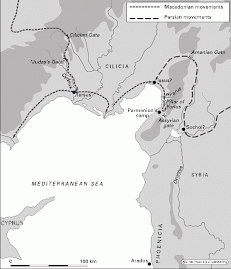
When the Macedonians reached Cilicia in August 333, they heard rumors that Darius III Codomannus was assembling an army in Babylonia. In fact, the Persian king had left Babylon in July and was approaching the Macedonians as swift as his large army allowed him to. In his Live of Alexander, Plutarch of Chaeronea writes that his army counted 600,000 men, which is of course exaggerated, but shows that Darius was believed to have an overwhelming majority.
Meanwhile, Alexander had fallen ill. Already in Antiquity, it was assumed that he was exhausted, but in fact, the months since Gordium had been tranquil. There is a famous anecdote about Alexander and his doctor Philip of Acarnania, which can be read here.
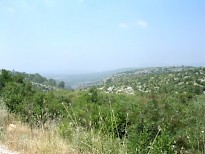
When Alexander had recovered, he immediately launched a new campaign. He went to the west, fighting against the mountain tribes of Cilicia, who might cut off the road through the Cilician Gate. Western Cilicia, which was and is very inaccessible, had a very bad reputation for what the ancient sources variously call bandits, brigands, desperadoes or criminals but were in fact tribesmen who refused to live a sedentary life. In Alexander's age, they were called "the rough Cilicians". During the Roman age, they were to become notorious as the Isaurians.
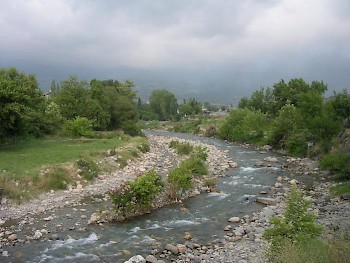
While Alexander was in Rough Cilicia, Parmenion and a small army were ordered to occupy the "Assyrian gate". This was the pass between the coastal plain of Cilicia and the plain of the river Orontes; the main road from Babylonia to Cilicia went through this pass. Parmenion must have been puzzled by the fact that Darius did not show up, but was not alarmed until he received word that Darius' huge army was at Sochi, only two days away. A courier was sent to Alexander's army, which covered 120 kilometers in forty-eight hours and joined Alexander's army near Myriandrus.
The two Macedonian commanders were planning to attack Darius in Sochi when they discovered that the Persian army was no longer there and was, in fact, facing their rear. With his enormous army, the Persian king had crossed the Amanus Mountains, had captured Issus, and had cut off the only Macedonian line of supply. Darius had trapped Alexander.
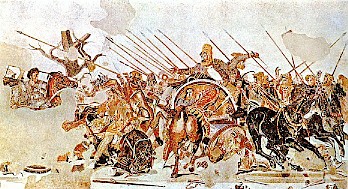
The Persians could afford to wait until the invaders surrendered: the Macedonian army could neither move to the east nor to the south, which was unknown enemy territory. The only option Alexander had, was to return to the north and attempt an all-out attack on a grand army of professional Persian soldiers and Greek mercenaries. At the Granicus, the Macedonians had fought against local levies, and the Persian garrisons in Turkey had been relatively small. Now, real fighting could be expected.
Battle
The Macedonian army probably numbered 41,000 infantry and 6,000 cavalry; the Persian numbers are unknown, but 80,000-100,000 is probably not a bad estimate. When the Macedonians advanced, they descended to a river named Pinarus and had a good view of their opponents' line on the other side of the river. Darius and the Greek mercenaries stood in the center, the wings were occupied by the Cardaces, a Persian phalanx. Alexander made some adjustments to his battle array and already wanted to attack, when he discovered that Darius had posted a force on the mountain to the Macedonian right. Without countermeasures, this force would attack the Macedonian rear. Some light infantry, some horsemen and archers were posted on the foothills to neutralize the danger.
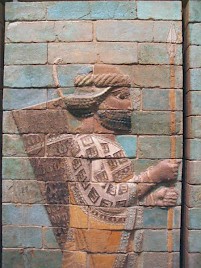
Alexander led the Companion cavalry to the right: this would force a part of the Cardaces to move in the same direction, thereby creating a gap with the Cardaces standing near the center. Then, Alexander wheeled towards the gap, broke through the enemy lines and attacked the Persian center. At the same time, the phalanx had crossed the river and made a frontal attack on the Persian right wing and the Greek mercenaries.
Darius had been fighting from his chariot until his guard had been annihilated. He was now forced to retire from the battlefield (text). The Greek authors have called this cowardice, but it was not. It might have been honorable to die on the battlefield, but it was not practical. Darius knew what would happen after his heroic death: the rival factions that had almost caused a civil war in the years before his accession, would be at each other's throats again, and the invader would be able to overrun the whole, divided empire. If the empire were to survive, civil war ought to be prevented at all costs. So he retired to Issus, leaving his demoralized men as a prey to the Macedonians and the vultures.
The Macedonian losses were heavy. Our sources mention 450 dead and 4,000 wounded. There are no reliable statistics of the Persian casualties, but they may have been between 10,000 and 20,000. Since most of the fighting had taken place near the Pinarus and sword wounds are extremely bloody, there is no reason to doubt that the river had really turned red.
Aftermath
One of the most impressive actions took place after the battle: Parmenion rushed to Damascus (350 kilometers through enemy territory) and seized Darius' treasure. He surprised the Persian garrison and took with him almost 55 ton gold, a great quantity of silver, 329 female musicians, 306 cooks, 13 pastry chefs, 70 wine waiters, 40 scent makers, and the women who had lived at Darius' court. Small surprise that Parmenion needed 7,000 pack animals to bring the booty to Alexander.
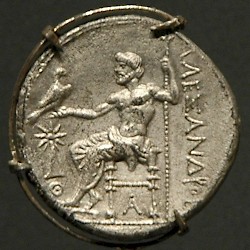
The gold and silver taken at Damascus was used to mint new coins. They showed the head of Alexander's legendary ancestor, the demigod Heracles (with Alexander's features), and on the reverse the supreme god Zeus seated on a throne. These coins would be acceptable to the Phoenicians, whom Alexander wanted to persuade to switch sides: they venerated Heracles under the name Melqart and could recognize the seated man as their god Ba'al. This would become Alexander's normal coin type.
Among the captive women were Darius' mother Sisygambis, his wife Statira, his six year old son Ochus, and his daughters Barsine (or Statira) and Drypetis. The Macedonian king treated them kindly, which was not an act of courtesy but simply a claim to the Persian throne. In the ancient Near East, a new king took care of the harem and family of his predecessor. Plutarch tells us that Alexander, "esteeming it more kingly to govern himself than to conquer his enemies", sought no intimacy with Darius' wife (text). This is not true: Statira was captured in November 333 and died in childbirth in September 331. Darius cannot have been the father of the baby.
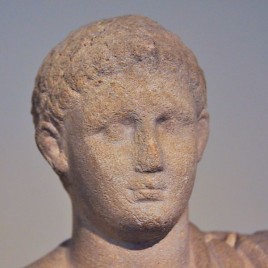
Among the Persian women was Barsine, the widow of the former Persian supreme commander in the west Memnon of Rhodes. She was some seven or eight years older than Alexander, and the two had already met each other, when she, Memnon, her father Artabazus and her brother Pharnabazus were staying in Macedonia as exiles. The childhood friendship was now renewed as a serious love affair.
Alexander was now twenty-three. According to the Macedonian ideas about love and sexuality, he had to find a woman to marry; the time for homosexual affairs was over. His lover Hephaestion had to find a new role. It should be noted that the friendship between the two young men remained close; Alexander was deeply shocked when Hephaestion died in 324.
In the aftermath of the battle, Alexander founded a new city, where the 4,000 wounded were settled. He called it Alexandria, a name that lives on in the modern name Iskenderun. The site of the town was well chosen: it commanded the access to the Assyrian gate. (Alexander was not the first one to name a town after himself. When his father had refounded Crenides in 356, he had called it Philippi.)
Shortly after the battle, a messenger arrived, delivering a letter from king Darius, who offered a huge ransom for his mother, wife and children. Alexander refused. In the next months, there were several diplomatic exchanges - the chronology is unclear that culminated in Darius' offer of all countries west of the Euphrates to Alexander.
"I would accept it," said Parmenion after reading the proposal, "if I were Alexander."
"So would I," replied Alexander, "if I were Parmenion."
Alexander's first letter to the man who had trapped him near Issus was intentionally rude. He insulted Darius, accused him of several crimes he had not committed (e.g., the murder of Alexander's father Philip), and announced that he would hunt him down and kill him. If Darius wanted to write him again, Alexander said, the Persian should not write to him as an equal, but should regard him as master of the Persian possessions.
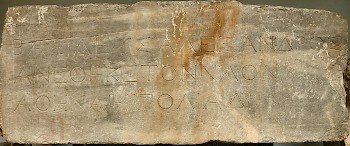
The Greek author Arrian of Nicomedia has retold in his own words what was in this letter (text). Although he may have colored it a bit, it is clear that Alexander for the first time claimed to be more than the king of Macedonia. Arrian uses the expression "king of Asia" to describe Alexander's new title. That Alexander claimed the Persian kingdom at this early stage - before he had actually conquered Persia - can be corroborated from the fact that he entered Darius' harem. Other proof can be found in a Babylonian diary, which states that Alexander already called himself "king of the world" when he entered Babylon. Finally, Alexander starts to call himself "king" in his inscriptions after 333, something he had not done before.
Having won the battle, having found a girlfriend, having humiliated Darius, having claimed the royal title, Alexander proceeded along the Orontes to Emessa. There, he turned to the west and reached Aradus, the northernmost city of Phoenicia. It surrendered immediately.